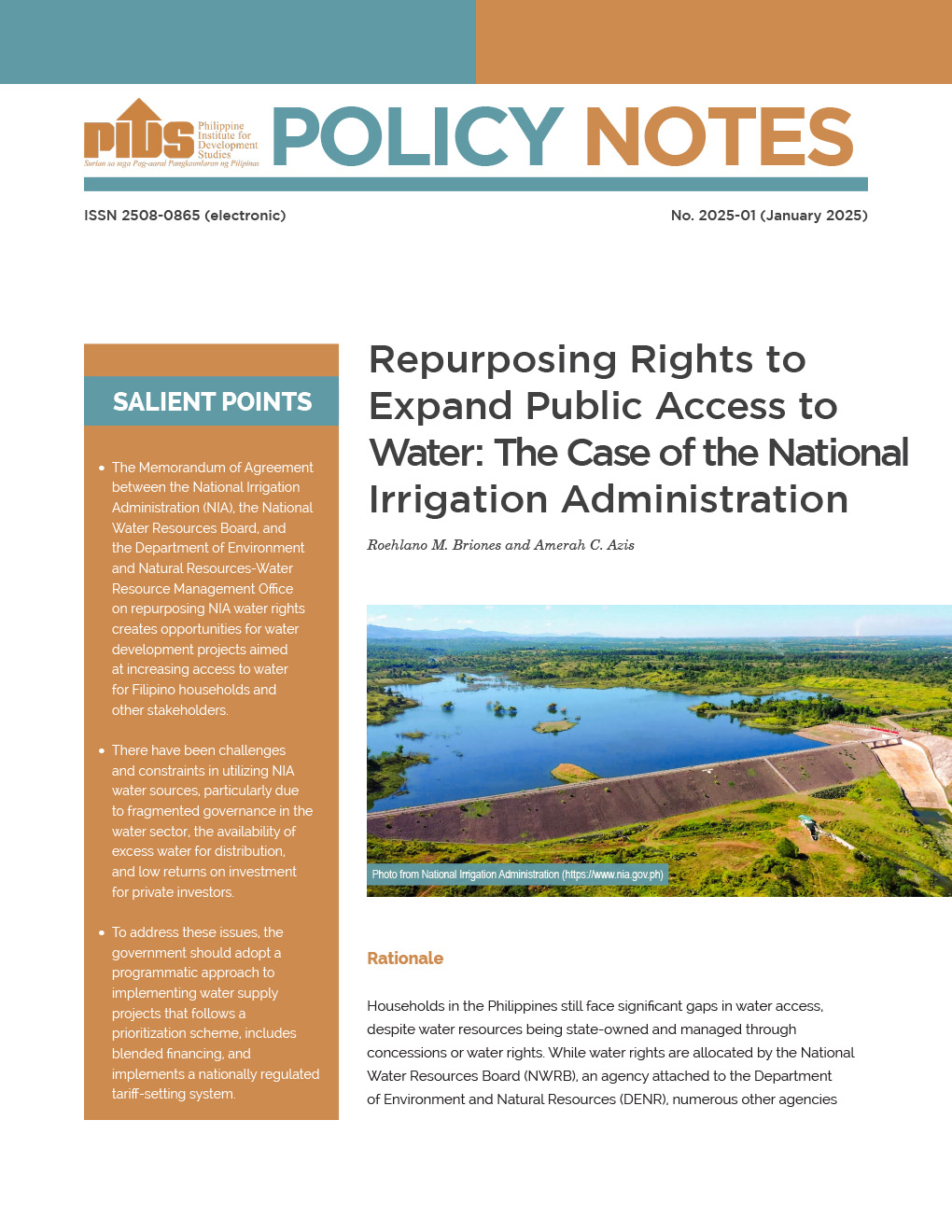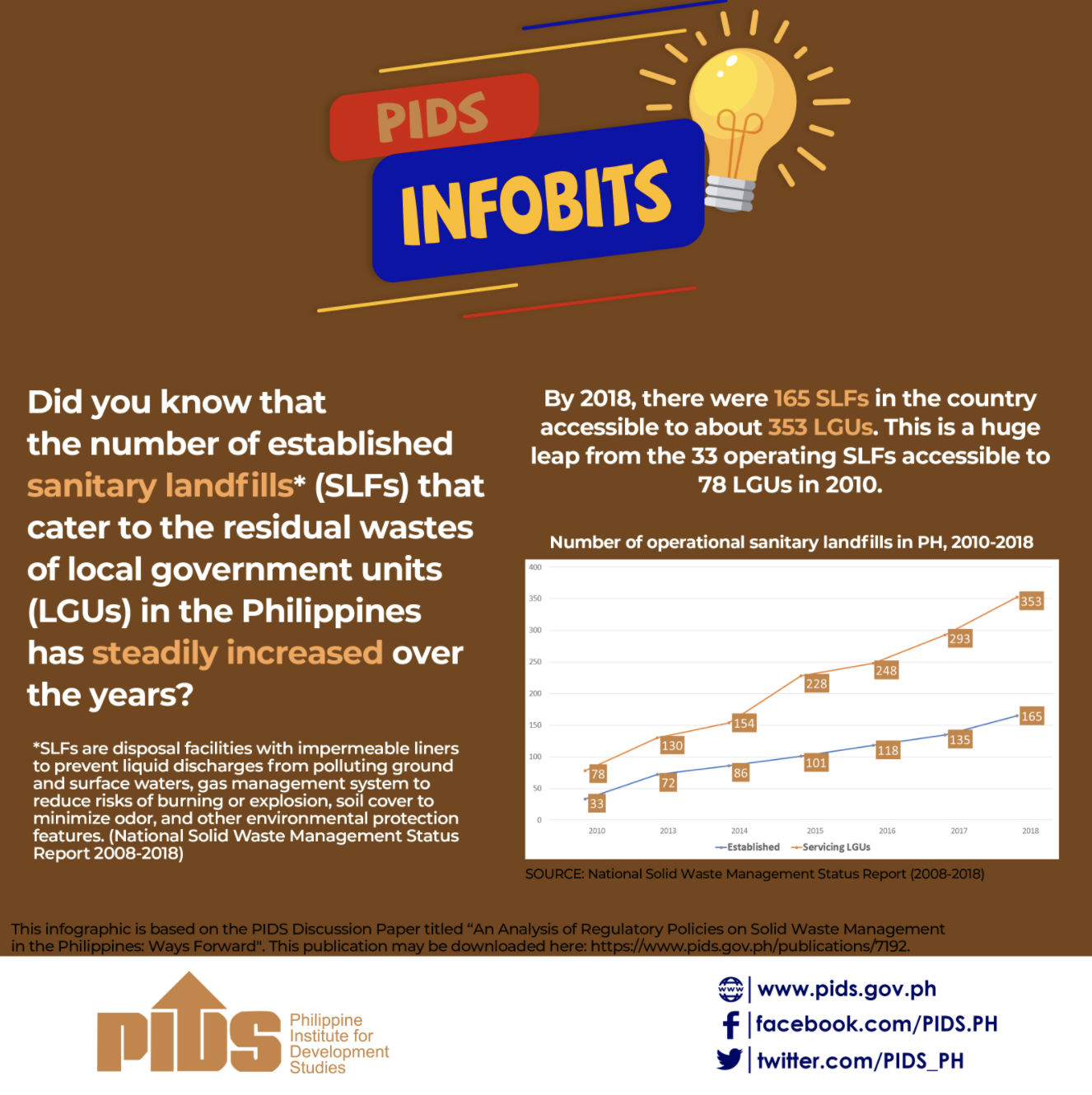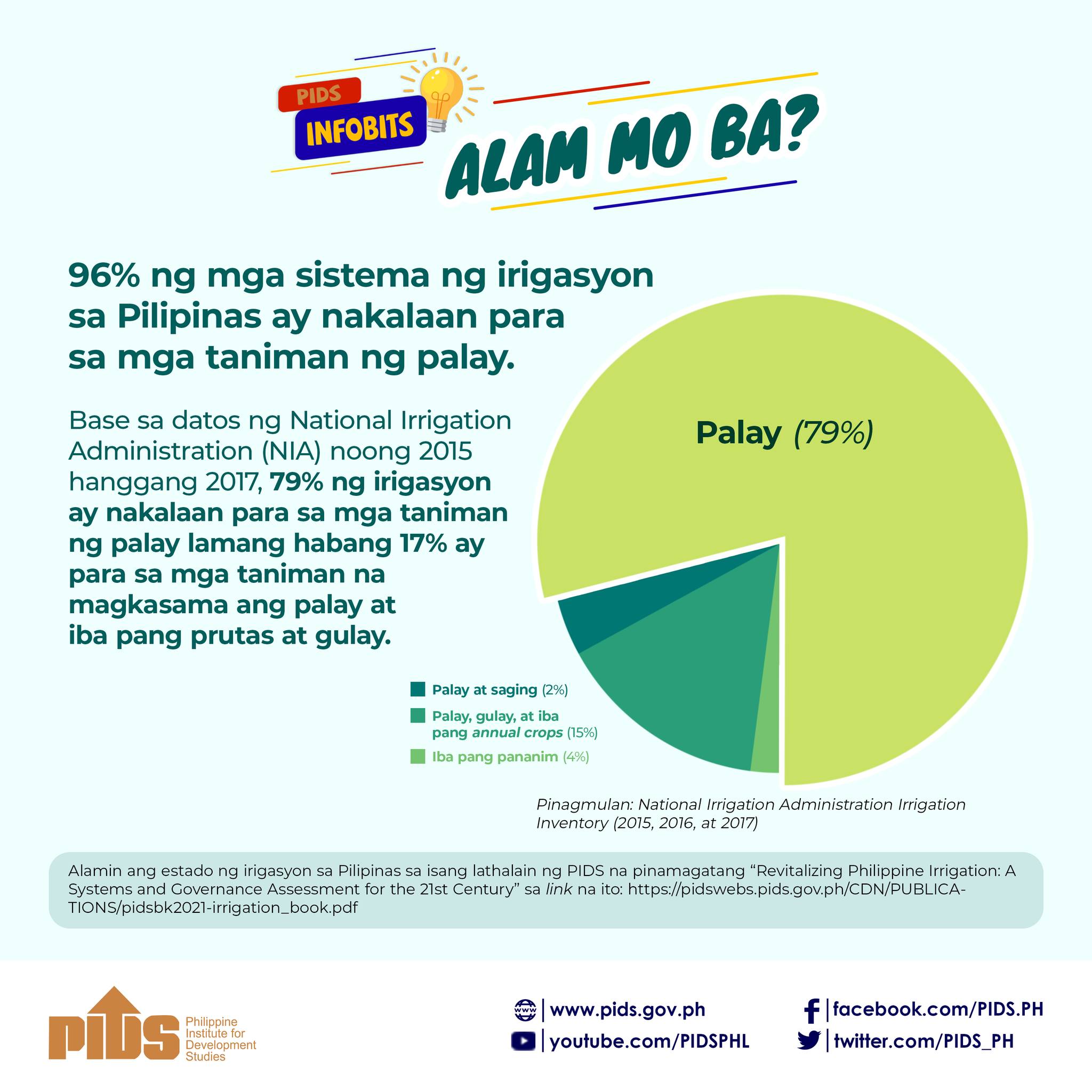UNDERDEVELOPMENT, mismanagement and environmental degradation have kept the irrigation sector from delivering expected results, according to a paper produced by a government think tank.
In a discussion paper, Philippine Institute for Development Studies (PIDS) researchers headed by De La Salle University Professor Arlene B. Inocencio identified key institutional and technical constraints to improving performance of both national and communal irrigation systems.
The think tank released the study titled: “Technical and Institutional Evaluation of Selected National and Communal Irrigation Systems and Characterization of Irrigation Sector Governance Structure” for public discussion this month.
The study evaluated 66 communal irrigation systems and 22 national irrigation systems in 16 provinces in Luzon. It forms part of PIDS’ research project to evaluate the effectiveness and impacts of key government programs and projects.
In their evaluation, the researchers found the expansion of national irrigation systems’ service areas slowed in the last decade and have been concentrated in four regions only.
“Cropping intensity only slightly increased over the years. In fact, wet season irrigation intensity appears to have largely slowed down,” the discussion paper read.
The study also noted that collection efficiency only “noticeably improved” in two regions in Luzon and turned out worst in the Western Visayas Region.
“The Mindanao regions appear to have been performing better in terms of this indicator, consistent with the corresponding improvement in cropping intensity,” the researchers noted.
Also, the study pointed out issues such as inadequate water during the dry season, flooding during the wet season, high incidences of canal problems and siltation/solid waste problems.
“Irrigation canal problems were ranked first in the list of problems, and followed by institutional problems and then by calamities/pest infestation causing production problems,” it read.
Meanwhile, the service area of communal irrigation systems has also grown albeit “relatively very slow.”
“However, the trends in actual irrigated areas during the wet and dry seasons irrigation intensities never reached the 80% mark and even declined by about 20% in 2012,” according to the study.
The researchers further cited as “serious concern” the decline in amortization collection efficiency in communal irrigation systems.
“With the rise in equity schemes, the amortization collection decreased and became a less significant source of income. Despite this trend, amortization collection efficiency drastically declined, making this a serious concern.”.
The paper enumerated specific interventions and policy changes to improve the provision of irrigation in the country. These include the development of a systematic approach to water allocation and distribution, an integrated development plan, and a review of existing policies and regulations that are hampering the growth of the irrigation sector.
“Good governance of irrigation systems must start with a design that ensures compatibility with operational realities and an acceptable level of financial viability to ensure sustainable performance,” Ms. Inocencio was quoted in a press statement issued April 14.
To improve operational performance of irrigation systems, Ms. Inocencio recommended that government shift to a “new paradigm” of interactive and integrated design.
The study recommended that the National Irrigation Administration (NIA) and other agencies involved in operations and maintenance of irrigation systems to develop an irrigation and water research and development program.
For instance, the researchers suggested the establishment and provision of funds for water resource centers in universities, composed of technical and socioeconomic experts whom the National Economic and Development Authority (NEDA).
“This will strengthen the capacities of NIA, NEDA, and the Department of Agriculture in monitoring and evaluating irrigation projects through the conduct of rigorous and objective analwyses to guide their decisions,” Ms. Inocencio noted. --
In a discussion paper, Philippine Institute for Development Studies (PIDS) researchers headed by De La Salle University Professor Arlene B. Inocencio identified key institutional and technical constraints to improving performance of both national and communal irrigation systems.
The think tank released the study titled: “Technical and Institutional Evaluation of Selected National and Communal Irrigation Systems and Characterization of Irrigation Sector Governance Structure” for public discussion this month.
The study evaluated 66 communal irrigation systems and 22 national irrigation systems in 16 provinces in Luzon. It forms part of PIDS’ research project to evaluate the effectiveness and impacts of key government programs and projects.
In their evaluation, the researchers found the expansion of national irrigation systems’ service areas slowed in the last decade and have been concentrated in four regions only.
“Cropping intensity only slightly increased over the years. In fact, wet season irrigation intensity appears to have largely slowed down,” the discussion paper read.
The study also noted that collection efficiency only “noticeably improved” in two regions in Luzon and turned out worst in the Western Visayas Region.
“The Mindanao regions appear to have been performing better in terms of this indicator, consistent with the corresponding improvement in cropping intensity,” the researchers noted.
Also, the study pointed out issues such as inadequate water during the dry season, flooding during the wet season, high incidences of canal problems and siltation/solid waste problems.
“Irrigation canal problems were ranked first in the list of problems, and followed by institutional problems and then by calamities/pest infestation causing production problems,” it read.
Meanwhile, the service area of communal irrigation systems has also grown albeit “relatively very slow.”
“However, the trends in actual irrigated areas during the wet and dry seasons irrigation intensities never reached the 80% mark and even declined by about 20% in 2012,” according to the study.
The researchers further cited as “serious concern” the decline in amortization collection efficiency in communal irrigation systems.
“With the rise in equity schemes, the amortization collection decreased and became a less significant source of income. Despite this trend, amortization collection efficiency drastically declined, making this a serious concern.”.
The paper enumerated specific interventions and policy changes to improve the provision of irrigation in the country. These include the development of a systematic approach to water allocation and distribution, an integrated development plan, and a review of existing policies and regulations that are hampering the growth of the irrigation sector.
“Good governance of irrigation systems must start with a design that ensures compatibility with operational realities and an acceptable level of financial viability to ensure sustainable performance,” Ms. Inocencio was quoted in a press statement issued April 14.
To improve operational performance of irrigation systems, Ms. Inocencio recommended that government shift to a “new paradigm” of interactive and integrated design.
The study recommended that the National Irrigation Administration (NIA) and other agencies involved in operations and maintenance of irrigation systems to develop an irrigation and water research and development program.
For instance, the researchers suggested the establishment and provision of funds for water resource centers in universities, composed of technical and socioeconomic experts whom the National Economic and Development Authority (NEDA).
“This will strengthen the capacities of NIA, NEDA, and the Department of Agriculture in monitoring and evaluating irrigation projects through the conduct of rigorous and objective analwyses to guide their decisions,” Ms. Inocencio noted. --












